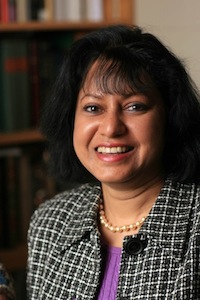Guest Speaker: Asma Afsaruddin
Competing Visions of the Shari'a: The Real Clash Within the Islamic World

On February 21, 2012, Professor Asma Afsaruddin, William & Mary’s 2012 Kraemer Middle East Distinguished Scholar-in-Residence spoke at the law school. Her talk was titled Competing Visions of the Shari‘a: The Real Clash Within the Islamic World. In her talk, she described competing discourses within the Islamic community, identifying two major competing schools of thought, “modernist” or “reformist” Muslims and “hard-liners” or “absolutists”. The rift between these groups originates in opposing ideas about the nature and role of Shari‘a, as well as disagreement about the role of religious and political authority in a modern Islamic state. Professor Afsaruddin outlined how the beliefs of each of these groups shape their ideas about the place of women in Muslim society, and the meaning and purposes of jihad. Her appearance was co-sponsored by the Reves Center for International Studies and the Program in Comparative Legal Studies and Post-Conflict Peacebuilding.
Asma Afsaruddin is professor of Islamic Studies and chairperson of the Department of Near Eastern Languages and Cultures at Indiana University, Bloomington. She received her Ph.D. in Near Eastern Studies from the Johns Hopkins University in 1993 and previously taught at Harvard and Notre Dame universities. Her fields of specialization are the religious and political thought of Islam, Qur’an and hadith, Islamic intellectual history, and gender.
Professor Afsaruddin is the author and/or editor of six books, including the forthcoming Striving in the Path of God: Jihad and Martyrdom in Islamic Thought and Praxis (Oxford: Oxford University Press, 2012); The First Muslims: History and Memory (Oxford: OneWorld Publications 2008); and Excellence and Precedence: Medieval Islamic Discourse on Legitimate Leadership (Leiden: E.J. Brill, 2002). She has also written over fifty research articles, book chapters, and encyclopedia entries exploring issues as diverse as pluralism and dialogue in the Qur’an, moderation in Islamic thought; exegetical, legal, and ethical approaches to war and peace in Islam, political Islam, hadith criticism, roles of Muslim women, and Muslim-Christian relations. She has lectured widely in the US, Europe, and the Middle East on these topics and frequently consults with US governmental and private agencies and media outlets on contemporary Islamic movements, inter-faith, and gender issues.
Afsaruddin is currently a senior editor of the Oxford Encyclopedia of Islam and Women (2012), chair of the board of directors of the Center for the Study of Islam and Democracy; member of the advisory board of a new project called Intertwined Worlds based at the Woolf Institute, Cambridge University, and a member of the academic council of the Prince al-Waleed Center for Muslim-Christian Understanding at Georgetown University.
Her research has been funded among others by the American Research Institute of Turkey, the Harry Frank Guggenheim Foundation and the Carnegie Corporation of New York, which named her a Carnegie Scholar in 2005.